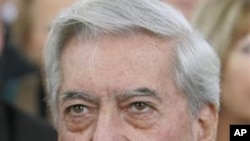The 2010 Nobel Prize in Literature has been awarded to the Peruvian novelist, journalist and politician Mario Vargas Llosa, a dark horse candidate who is equally well-known for his forays into politics.
Mario Vargas Llosa received little attention in the speculation that preceded Thursday's announcement, when predictions focused on writers from South Korea, Kenya and the United States. And the award will do little to diminish the prize-awarding Swedish Academy's reputation for selecting overtly political writers.
The Academy's citation honors the 74-year-old author for what it called "his cartography of structures of power and his trenchant images of the individual's resistance, revolt and defeat."
Vargas Llosa first became a literary sensation in the 1960s. The Time of the Hero, his semi-autobiographical first novel published in 1963, is set among cadets in a Lima military academy. He was just past his thirtieth birthday when he wrote his tour de force Conversation in the Cathedral, in which the protagonist investigates his father's involvement in the killing of an infamous Peruvian gangster, learning in the process how the country's dictatorship maintains its hold on power.
A prolific writer who defies easy categorization, Vargas Llosa's novels include historical works, political thrillers and even comedies and murder mysteries.
Immediately after announcing the award, Peter Englund, secretary of the Swedish academy praised Vargas Llosa's power and range as a novelist.
"He's a storyteller, basically a narrator. But what a storyteller. His books have a very complex structure, with shifting points of perspective and shifting time levels," he said. "There's much dialogue, but where the dialogue sort of fades in and fades out, criss-crossing several different time planes. He is a very versatile author, producing not just these great big books about Latin America and its dilemmas, but he has written in practically every genre there is."
Like his former friend and now fellow Nobel Prize laureate, Gabriel Garcia Marquez, who he reportedly punched in 1976 for reasons neither man has ever revealed, Vargas Llosa is actively political. He was initially a supporter of the Cuban revolution led by Fidel Castro, but became disenchanted with communism and in 1990 ran for the Peruvian presidency as head of the center-right Frente Democrático coalition.
Formal Nobel award ceremonies will be held in Stockholm and Oslo, Norway on December 10, the anniversary of the 1896 death of Alfred Nobel, the founder of the prizes. The winner of the Nobel Peace Prize will be announced Friday in Oslo.




